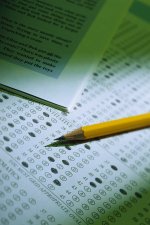18. Examinations and Assessment Process

All personal data produced and processed for the purpose of examinations and assessment will be subject to a student's right of access under Data Protection legislation, except where an exemption applies.
The Data Protection Act 2018, Schedule 2, Part 4, Section 25 refers:
"(1) The [right of an individual to access their own personal data] does not apply to personal data consisting of information recorded by candidates during an exam.
(2) Where personal data consists of marks or other information processed by a Controller:-
(a) for the purposes of determining the results of an exam, or
(b) in consequence of the determination of the results of an exam
[the Controller must respond to the request in the timescales below]"
i) Within one month, where a request is received after exam results have been released, and
ii) Where a request is received before the exam results have been released, either 5 months from the date of the request or 40 days after the date the results were announced, whichever is earlier.
The ICO guidance refers: https://ico.org.uk/your-data-matters/schools/exam-results/
18.1 Examination scripts
Examination scripts are expressly exempted from the data subject's right of access (see DPA18 Sch 2 Pt 4 S.25 (1) above). This means that the University is under no obligation to permit examination candidates to have access to either original scripts or copies of those scripts. "Exam" means "an academic, professional or other examination used for determining the knowledge, intelligence, skill or ability of a candidate and may include an exam consisting of an assessment of the candidate's performance while undertaking work or any other activity" [DPA 2018 refers], thus written assessment work and field work are covered. However this exemption is discretionary and the University may still choose to provide a script under a subject access request.
18.2 Examiners' comments
Both internal and external examiners' comments, whether made on the script, or in another form that allows them to be held and applied to the original script (e.g. in a coded table), will be covered by the Data Protection legislation. A data subject has the right to request that a copy or summary "in intelligible form" is provided within the stipulated timescale. This limit is normally one month (approx. 30 calendar days as determined by ICO guidance), but in the case of examinations the legislation specifically notes that a request may be made before results are announced. In this case there is a limit of five months from the date of the request or 40 days from the announcement of the result, whichever is the earlier (as determined by ICO guidance), but in the case of examinations the legislation specifically notes that a request may be made before results are announced. In this case there is a limit of five months from the date of the request or 40 days from the announcement of the result, whichever is the earlier.
18.3 Examination marks
Data Protection legislation provides an exemption in relation to the period in which the University is required to deal with a request for access to examination marks, if that request is made before the results are published. The University must respond within five months of the date of the request or 40 days of the date the results are published, whichever is the earlier.
18.4 Providing feedback
Provision of feedback on both formative and summative assessment is increasingly seen as an important part of the educational process to promote learning and facilitate improvement. In order to provide feedback "in intelligible form" academic areas must ensure that examiners write comments that are readily comprehensible, in the absence of the script, to reduce the likelihood that the University will only be able to meet this requirement by producing the script.
18.5 Automatic processing
Data Protection legislation provides data subjects with the specific right to be informed of the logic of (or to object to) any purely automated decision that significantly affects them. The University's School examination boards review and validate the results of each student, taking into account such variables as personal circumstances and health issues, therefore this process should be transparent to students.
18.6 Examination Board minutes and related documentation
Minutes of i) the University's Examination Boards that contain discussion about data subjects; and ii) the University's School Extenuating Circumstances Boards which are prepared for the purposes of supplying recommendations for consideration by Examination Boards, will be subject to data subject access where candidates are named, or referred to by identifiers from which students may be identified (e.g. by matriculation number) and an extract of the relevant entry (entries) will be provided.
It should be noted that examination board minutes and related documentation which concerns general discussions, e.g. about moderation standards, will very likely be accessible to individuals under the Freedom of Information (Scotland) Act 2002, (FOISA) unless an exemption can be claimed.
To comply with the University's obligations under both DP legislation and FOISA, clerks to the Examination Boards should ensure that the minutes of meetings are prepared so that the recording of discussions about specific students is kept separate from that of general business matters. A  FOISA front sheet has been developed for this purpose.
FOISA front sheet has been developed for this purpose.
18.7 Disclosure of results
Since examination results constitute personal data they should not be disclosed to third parties unless one of the relevant criteria in the Data Protection legislation is met. The usual criterion is to gain consent to the disclosure e.g. for inclusion of results in the graduation lists published in "The Scotsman" newspaper and in the Graduation Programme. If a student has opted out of publication, staff must not then disclose results to enquirers, unless specifically requested to do so by the data subject in writing, or where there is legitimate reason to do so, such as the prevention of fraud, e.g. where a student misrepresents their results to an employer. The University's procedure for dealing with false qualification claims is in  Section 8.11 of this Code of Practice.
Section 8.11 of this Code of Practice.
18.8 Withholding results
Results will be withheld in accordance with the University's policy on  Tuition Fees (which includes provisions governing other student debt) and the University's obligations under the Data Protection legislation.
Tuition Fees (which includes provisions governing other student debt) and the University's obligations under the Data Protection legislation.
18.9 Rights Requests
Student's wishing to make a request for their personal data can do so using guidance available in the
Rights & Access section.
Page last updated 18 March 2019